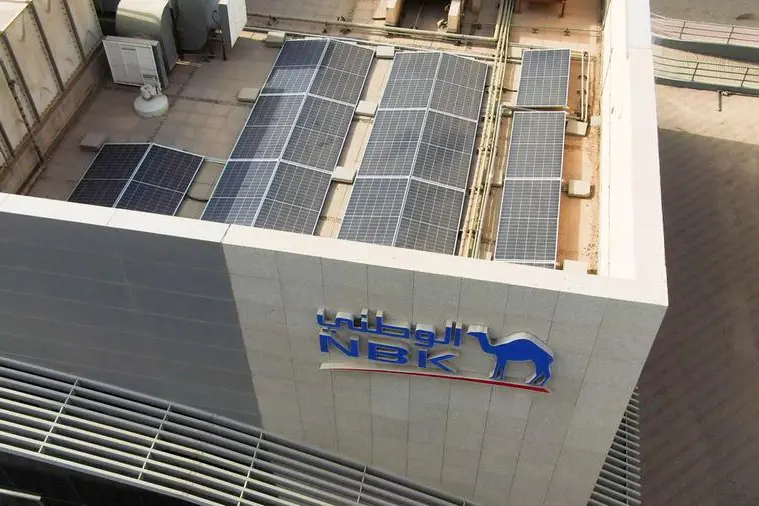PHOTO
- Al-Othman: We aim to reduce our operational emissions by 25% by 2025 and aspire to reaching net-zero operational emissions by 2035
- NBK is firmly committed to supporting climate change initiatives and promoting sustainability throughout the bank and across our network
- We have an action plan to integrate climate change risk into our business model
- We are implementing many initiatives aimed at lowering energy consumption and GHG emissions
- We have geared our efforts to launch monitoring and control systems to improve the efficiency of energy and water consumption across our branches
In line with its leading role and key contributions towards the effective transition to a sustainable and low-carbon economy, National Bank of Kuwait (NBK) announced that it is ramping up its efforts aimed at transforming its network of branches to be environmentally friendly. NBK is targeting lower energy consumption levels as well as more dependency on renewable energy sources to reduce carbon emissions and support Kuwait’s vision to achieve sustainable growth enshrined in New Kuwait Vision 2035 and the National Development Plan.
As part of NBK’s sustainability strategy aimed at reducing net emissions and increasing renewable and clean energy dependency, the Bank has embarked on a project to install solar panels as a supplemental source of energy in its local branches, which was initially implemented in Kaifan branch as a pilot and will be rolled out in other branches. This initiative will immensely contribute to our efforts to effectively reduce carbon emissions. Along the same efforts focused on power consumption, the Bank is also using 100% energy efficient LED technology in all its branches.
NBK’s strategy also aims at implementing key steps to reduce operational emissions going forward, including the installation of Building Energy Management System “BEMS”, a system which allows the Bank to monitor, analyse, and most importantly, control energy consumption to improve its efficiency across NBK network of branches. The automated system, installed in the Head Quarters, has the ability to remotely monitor and control energy and water consumption throughout NBK branches using its centralized system and the main control Unit.
“We remain deeply committed to doing our best efforts to fulfill our Sustainability commitment and fully support the global movement to transition to a low carbon economy and mitigate climate change risks, as we believe there is a hard road ahead.” Mr. Mohammed Al-Othman, GM - Consumer Banking Group at National Bank of Kuwait said.
Al-Othman indicated that NBK had set specific goals for sustainable business and devised standards to ensure that climate protection would have an important role in its future business model.
He highlighted that climate change is becoming one of the biggest challenges of our times, therefore, we at NBK, continually strive to lower our carbon footprint, as we aim to reduce operational emissions by 25% by 2025. Moreover, the Bank is currently reviewing all available technologies and development opportunities to expand its future reliance on renewable energy to achieve operational net zero by 2035.
Al-Othman stressed that NBK is witnessing an irreversible shift to further support climate change initiatives and the adoption of sustainability across the bank. All NBK employees are fully committed to supporting this transformation and are putting in their best efforts to achieve the Group’ vision of reaching net-zero operational emissions by 2035.
To reduce energy consumption and greenhouse gas emissions, NBK has embarked on several initiatives to optimize energy and water efficiency through automatic controls, automated heating and cooling sensors, and LED lights, in addition to launching an annual campaign to rationalize energy and water consumption.
NBK continues to maintain its leadership commitment to sustainability and supports responsible business practices that contribute to the sustainable development of Kuwait national economy. Most recently, the Bank launched its Sustainable Financing Framework, which is aligned with the International Capital Market Association (ICMA) and Loan Market Association (LMA) principles.
It is worth noting that NBK has recently made great strides in terms of sustainability, including the new Headquarters’ LEED Gold certification, reflecting the Bank’s commitment to adopt the highest sustainability standards, and improving all environmental factors that are collected, measured, and reported, including greenhouse gas (GHG) emissions and paper and plastic recycling. Moreover, NBK’s efforts were recognized by its inclusion in the Refinitiv AFE Low Carbon Select Index in MENA, in which NBK ranked first among regionals banks and Kuwaiti companies in terms of the index’s weight.
-Ends-




















